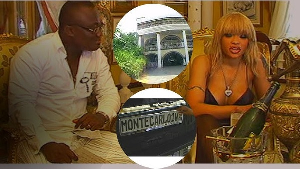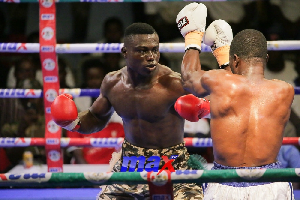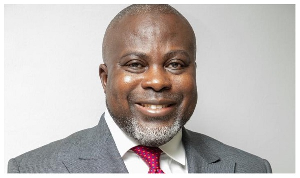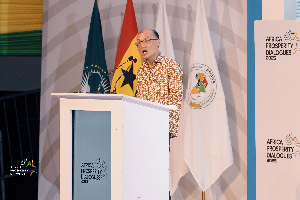(Let’s Walk the Talk for the Common Good of Our Motherland!)
Let me thank Ahmed for his evenly rounded and most elucidating piece on where we started from and where we are today. See "Wanted on Warrant: Kwame Nkrumah," Feature Article in Ghanaweb, dated Thursday, October 2, 2008, by Ahmed Bawa Kuyini.
First, Ahmed was absolutely on point when he cited the Seven-Year Development plan as "the first and best in Africa." Second, I share his thoughts that "[t]oday Nkrumah is not wanted by Interpol but by Ghanaians yearning to see a leader like him come forth to fulfil the dreams of a nation that has so much potential." Finally, I am particularly impressed by his observation on Dr. Kwame Nkrumah’s ("Nkrumah") educational program, especially his eloquent assessment of its impact on the Northern Region. I will add that, unlike many of Nkrumah’s successors who scramble for wealth, stashing millions of our hard earned funds in foreign banks and putting up mansions for themselves, their families, and girl friends, Ghanaians and the rest of the world are yet to see any evidence of any funds Nkrumah stashed or mansions he put up for himself, his family, or acquaintances. Before I proceed, let me be clear: I call the spade the spade and will comment on any Ghanaian leader as objectively as warranted, regardless of the political party from which the person hails. My comment here, therefore, should be read with no political or ethnic coloration.
Education-wise, no one can dispute the fact that the colonialists did not have much promises for our Northern brothers and sisters. Our Northern countrymen, who in my assessment suffered the worst brunt of colonialism, being "Protectorates," were allowed to have an ultra limited education. Ahmed described this most eloquently and accurately when he said that our Northern countrymenand women were allowed to be educated "[o]nly up to what used to be called standard 7." . . . .
Even outside of the North, the situation was not absolutely rosy. Only a few were lucky to be have formal education. More specifically, in most Ghanaian families, either for lack of funds or sheer failure to appreciate the benefits and promises of formal education, the practice across the country was to enroll in school only one member of the family, almost always, the oldest. It was thus common for family members to refer to this "lucky" one as "wotse," i.e., "our leader" or "our father." Where that oldest member was unable to cope with the travails of formal education, the promises that came with education were lost for the entire family, community, and, for that matter, the whole country. Nkrumah’s all encompassing free and compulsory educational program was a blessing, defying all the flaws of the older system regarding plights of people in the North as well as of those elsewhere in the country. It thus helped bridge, if not totally obviate, the gab between the rich and the poor, a gab that, but for his timely intervention, would have widened beyond any imagination. Today, barring occasional avoidable but unfortunate political and ethnic interjection, any Ghanaian, whether a Northerner or the youngest member of a family, can equally compete for any position neck to neck on a leveled playing field to the extent education is one of the criteria for that position. I cannot fathom how we can adequately thank our first President for his contribution on this score because he did not only "talk the talk;" he "walked the walk" too.
I can, however, add the following: the education delivered under Nkrumah’s program was of the highest quality, and it enhanced the image of Ghana and its nationals wherever we went. It also attracted people from all over the world to study in our universities. Because education is the best human capital and intellectual machine that any country would cherish, this immeasurable contribution makes Nkrumah’s iconic position in our history inexceptionable, at least, on that point. As human, Nkrumah surely was not without some foibles but, don’t we all? Let’s give credit where credit is due: all in all, Nkrumah’s towering pluses far out-weigh his shortcomings, and we should applaud him post-humously (albeit belatedly), emulate his positive examples, strive to effectuate his ideals, and surmount the high bars left us by his legacy.
One big question confronting us today is: to what extent can the enhanced posture of Ghana and its nationals continue? Undeniably, the unfortunate answer to this is that, unless our future leaders change their courses, our image which has been receding into an unstoppable abyss, would continue regressively in full swing to the point that no Ghanaian acting in good faith would be proud of. From what we have done thus far, the shocking and daunting mantra reflected in much of our politics have been that each regime tries to undo what its predecessors did, especially where those forebears belong to the opposite political party. My humble suggestion, to the contrary, is that our leaders should look at Nkrumah’s policies, extract the positive ones, and use them to work for the common good.
Running a country is not a race for selfishness. Nor should it be a scramble for personal aggrandizement, winning political pluses for parties or groups, or accumulation of wealth for or by family members, friends, and cronies in politics. Instead, it is for selfless and objective pursuits to get the best out of available resources for the country. Given this premise, I implore our leaders to be constructive, rather than destructive, in their handling of achievements or failures of their forebears. They should, and I repeat, they should work with and build on the achievements of their predecessors rather than trash them merely because they were done by members of the opposite party. In addition, crossing the political divide, minds of positive thinking Ghanaians should be tapped, based on the skills and knowledge they possess rather than on nepotism, tribalism, or the political affinity with those in power. After all, Mother Ghana has invested immensely in making Ghanaians what we are, and Ghanaians should be encouraged to pay back what we have benefitted from Mother Ghana’s largess by participating unqualifiedly in her development, not seeking greener pastures outside only because politics and tribalism close doors for otherwise qualified Ghanaians to participate in the Country’s development. In a nut shell, I respectfully add that we should sincerely comment on our governments, whether present or future, constructively and not vilify them merely because of our ethnic and political affiliation because constructive criticisms are progressively oriented whereas destructive criticisms only breed regressiveness and engender recipe for disunity and destruction.
Until I come with my next observation on Nkrumah, the question I like to leave with you, dear countrymen, especially those who were around in the sixties, is "have we been better off than we were then?" Frankly, my honest answer simply is "NO!". There are, indeed, many that argue that Nkrumah inherited a lot in our foreign reserves, and attribute Nkrumah’s launching of his projects to those reserves, totally ignoring the foresight, vigilance, level-headedness, objectivity, and pragmatism with which he handled those funds. But, assuming that those negative assessments were right, which I respectfully submit they weren’t, the question is, where are all those projects that were launched from our exhaustible reserves? The sad truth is that we have squandered them or, at least, left them to rot without any plans for their upgrade or replacement. At the very minimum, what we should ask ourselves in good faith is whether the stewardship of our post-Nkrumah’s era really can match his stellar record. We should ask ourselves whether we have handled what was left us with the shrewdness they require. The industries are gone, our roads are in shambles, we lack a credible healthcare system, our educational system has been anything but progressive, and the list increases ad infinitum! Indeed, if availability of funds was what enabled Nkrumah to launch all his enviable projects, what have our subsequent leaders been doing with the massive loans they have been getting? Loans are funds normally "bought" for moving forward. More specifically, any shrewd person getting a loan would have a plan to use the funds to improve its existing circumstances, especially where the loans come with the huge apron strings and interests characterizing ours. Nkrumah certainly would not have caved in to some of the draconian stings attached to these loans without ruffling feathers.
Dear Countrymen, let me stop here with the question I posed before: are we better off today than we were then?
Even with all the massive daily remittances from Ghanaians abroad and their laudable efforts to help resuscitate our economy by investing in Ghanaian businesses, our standard of living has been a far cry from that extant in the early 60s.
Please note again that I am not writing this with any political leaning. Instead, I want us all to reflect on how we started, where we started from, where we now are, and what we can do as one people with one destiny to make our country the best it can be. All is not lost: Let’s roll our selves and selflessly work together to rebuild our country. Lets put Ghana first, talking the talk and walking the walk that Nkrumah did with some of his policies!
Opinions of Tuesday, 7 October 2008
Columnist: Quaye, Nii Otu


















